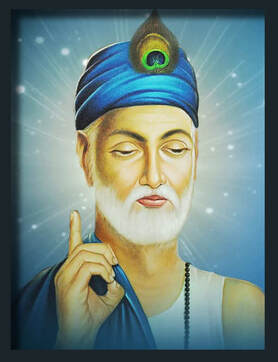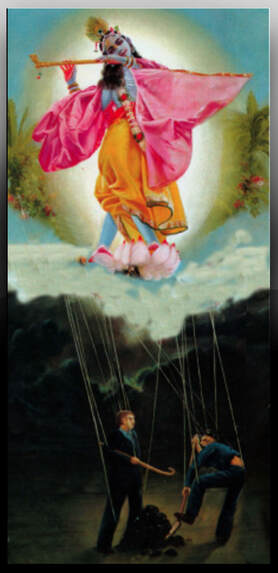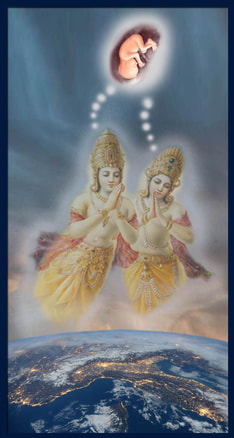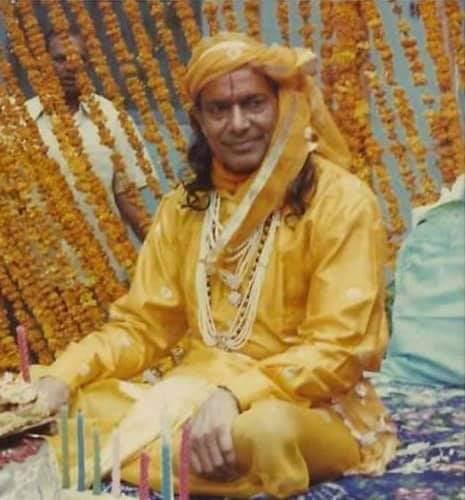|
Question:
Shri Maharaj Ji has told us that, “due to Their oneness with God, the words spoken by the Saint, are the same as those of God”. Saint Kabir was a God-realized Saint. And he has said जो करै सो हरि करै, होत कबीर कबीर ।
jo karai so hari karai, hota kabīra kabīra । "Whatever happens is done by God".
So, when God is the performer of all actions (the doer), then obviously I am not the doer; and when I am not the doer, then why do scriptures say that I have to face the consequences of my actions? |
|
Answer:
This statement of Saint Kabir has been taken out of context. Saint Kabir’s statement refers to the actions of the Saints and not to the actions of ordinary material souls. Uninformed about the real context of this statement, we often hide behind these words to defend our wrong-doings. This attitude can be extremely harmful and detrimental to our spiritual growth. Hence, we must deeply contemplate on this issue. Those whose mind and intellect are fully surrendered to God are called Saints. Since, mind is the doer of every action and when the mind is surrendered, the individual soul cannot perform any action, being fully surrendered to God, a saint becomes a non-doer. Then how are Saints seen performing actions? God performs all actions, on behalf of the Saint. Saint Kabir Das attested the same in His verse. Hota Kabir Kabir means - Kabirdas Ji says, "God does everything for the One who becomes like Kabir (a God realized soul)." |
जो करै सो हरि करै, होत कबीर कबीर ।
jo kara so hari karai, hota kabīra kabīra ।
jo kara so hari karai, hota kabīra kabīra ।
“Whatever happens is done by God”.
Let us examine the effects IF this statement was said for material beings.
1. Is God omniscient or ignorant? The Vedas answer
Let us examine the effects IF this statement was said for material beings.
1. Is God omniscient or ignorant? The Vedas answer
यः सर्वज्ञः सर्वविद्यस्य ज्ञानमयं तपः ।
yaḥ sarvajñaḥ sarvavidyasya jñānamayaṃ tapaḥ ।
yaḥ sarvajñaḥ sarvavidyasya jñānamayaṃ tapaḥ ।

“God is omniscient”.
Now, if He is all-knowing and He is the doer (or director) of all our actions, then why are some of our actions filled with ignorance?
2. If God really is the doer, then why do we experience ourselves to be the doer. Likewise, if He is the doer of our actions, then why do we feel miserable after doing some actions?
3. If God is the doer then why do we feel the need to plan and then execute our numerous plans? We ought not plan to commence even a single project.
4. If He is the doer of our actions then He ought to reap the fruits of those actions or perhaps forgive Himself. He should not make us receive the karmic reward or punishment. Even an ordinary person would not perform an action himself and expect someone else to face the consequences. How is it possible that one person ate contaminated food and another person vomited?
5. If He is the doer Himself why did He illustrate the good and bad actions and their respective results in scriptures? He should have just said that the souls do not have to do anything. Whatever is My desire, I'll make them do that. Let it be known that Vedas have 100,000 hymns out of which 80,000 hymns teach only the philosophy of good and bad deeds.
6. If He's the doer then why do some beings become blissful like Dhruv, Prahlad, Soor, Tulasi and Nanak etc. whereas the rest of us have to undergo such colossal suffering? Why then, did He create the 8.4 million life-forms?
7. If it is said that all this is just a play of God and in fact, living beings receive neither pleasure nor pain; then there should be no need for us to acquire Divine knowledge. Then why do we get pain and pleasure?
8. In addition, we are also aware that there are some people, who have studied the scriptures and accepted the theory of good and bad deeds, acquired true knowledge of the scriptures, attained God-realization after performing devotion, and continued to live very peacefully in this very world.
Now, if He is all-knowing and He is the doer (or director) of all our actions, then why are some of our actions filled with ignorance?
2. If God really is the doer, then why do we experience ourselves to be the doer. Likewise, if He is the doer of our actions, then why do we feel miserable after doing some actions?
3. If God is the doer then why do we feel the need to plan and then execute our numerous plans? We ought not plan to commence even a single project.
4. If He is the doer of our actions then He ought to reap the fruits of those actions or perhaps forgive Himself. He should not make us receive the karmic reward or punishment. Even an ordinary person would not perform an action himself and expect someone else to face the consequences. How is it possible that one person ate contaminated food and another person vomited?
5. If He is the doer Himself why did He illustrate the good and bad actions and their respective results in scriptures? He should have just said that the souls do not have to do anything. Whatever is My desire, I'll make them do that. Let it be known that Vedas have 100,000 hymns out of which 80,000 hymns teach only the philosophy of good and bad deeds.
6. If He's the doer then why do some beings become blissful like Dhruv, Prahlad, Soor, Tulasi and Nanak etc. whereas the rest of us have to undergo such colossal suffering? Why then, did He create the 8.4 million life-forms?
7. If it is said that all this is just a play of God and in fact, living beings receive neither pleasure nor pain; then there should be no need for us to acquire Divine knowledge. Then why do we get pain and pleasure?
8. In addition, we are also aware that there are some people, who have studied the scriptures and accepted the theory of good and bad deeds, acquired true knowledge of the scriptures, attained God-realization after performing devotion, and continued to live very peacefully in this very world.
On the basis of these arguments, one may conclude that if we accept God as the doer, it would prove that God is unjust. Moreover, by following this kind of ideology we would become lazy and all of our actions will be to please our own mind (self-willed). We are already undisciplined. Accepting God as the doer of our actions would lead us to be more undisciplined and careless, which would cause our own spiritual-downfall.
But there are a few verses of Gita and Ramcharitmanas, which testify God as the doer.
For instance the Gita says -
But there are a few verses of Gita and Ramcharitmanas, which testify God as the doer.
For instance the Gita says -
|
ईश्वरः सर्वभूतानां हृद्देशेऽजुर्न तिष्ठति । G. 18.61
īśvaraḥ sarvabhūtānāṃ hṛddeśe'jurna tiṣṭhati । भ्रामयन् सर्वभूतानि यन्त्रारूढ़ानि मायया ॥ bhrāmayan sarvabhūtāni yantrārūḍha़āni māyayā ॥ “O Arjun! The Supreme Lord dwells in the hearts of all living beings. According to their karmas, He directs them to roam in different life forms in this world of Maya as if mechanically“.
Likewise Saint Tulasidas Ji also says - उमा दारु योषित की नाईं । सबहिं नचावत राम गोसाईं ॥
umā dāru yoṣita kī nāīṃ ।sabahiṃ nacāvata rāma gosāīṃ॥ “O Parvati! We are all puppets in the hands of Lord Ram”.
In both of the above verses of Gita and Ramcharitmanas we are compared to a puppet who dances on the instructions of the puppeteer. It seems that we perform all actions, as per His will, and if so, that’d mean that we have no free-will. Let us clarify the real meaning of these verses. The sensory organs (eyes, ears, nose, skin and tongue) are not the real senses (Gyanendriyan). They are merely the physical containers inside which the senses reside. The power that resides inside the sensory-organs alongwith the mind and the intellect, performs their respective work; that is the real sense-faculty. |
The Vedas say -
|
यन्मनसा न मनुते येनाहुर्मनोमतं तदेव ब्रह्म नं विद्धि नेदं यदिदमुपासते ।
यच्चक्षुषा न पस्यति येन चक्षुँषि पस्यति तदेव ब्रह्म त्व विद्धि नेदं यदिदमुपासते । यच्छ्रोत्रेण न श्रृणोति येन श्रोत्रमिदँ श्रृणोति तदेव ब्रह्म विद्धि नेदं यदिदमुपासते । |
yanmanasā na manute yenāhurmanomataṃ tadeva brahma naṃ viddhi nedaṃ yadidamupāsate ।
yaccakṣuṣā na pasyati yena cakṣum̐ṣi pasyati tadeva brahma tva viddhi nedaṃ yadidamupāsate । yacchrotreṇa na śrṛṇoti yena śrotramidam̐ śrṛṇoti tadeva brahma viddhi nedaṃ yadidamupāsate । |
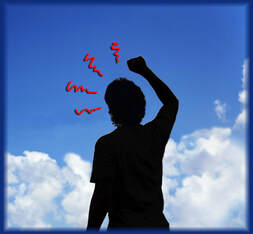 Don't waste time in accusing God, our destiny, time. Instead use this time to build your future.
Don't waste time in accusing God, our destiny, time. Instead use this time to build your future.
“The structure of mind does not think, there is a power of thinking given by God which thinks. These eyes do not see. There is a sight given by God that sees. The ears we see do not hear. They are just an instrument for hearing. There is power of hearing inside the material ears that hears.” Likewise, all other senses work, only when power is given by God. Whenever the power of eyes, ears, nose, tongue, etc. is taken away, these sense-organs return to their original state which is the material inert object.
Think about it; the dead body also has the same ears, yet those ears cannot hear. Why? Because the power of hearing is gone.
God is like the powerhouse which gives electricity to the house (jeev). The house owner may choose to live in the dark or utilize the electricity to run an air conditioner in the summer and a heater in the chilly winters or may decide to use the same electricity to commit suicide. A powerhouse cannot be held accountable for any mishap in the house. Similarly, God has given us the gift of the Gyanendriyan (five senses), mind and intellect. The onus is on us to make the best use of these precious gifts from God. We can use them to break free from this insipid world and attain divine bliss or we can misuse them and end up hurting ourselves. It is our choice. God cannot be held responsible for our negligence.
Hence, think rationally - we perform actions according to our viewpoint, association and situation. Sometimes we get favorable results and sometimes we don't. It's not fair to blame anyone for our failures.
Our actions/choices are already so errant. What will happen in the world when the faith in God will completely disappear?
So, instead of accusing God, our destiny, time etc. it's better to utilize the rarest of rare human-bodies for our own betterment. Human body is the only form of life where the rewards for our actions are granted right-a-way. That's why it's called Karm-yoni (read Human Form: Boon or Bane?). The other forms of life are bhog yoni, in which we can undergo the fruits of our actions performed in innumerable past lives.
Saint Tulsidas wrote the same in his words -
Think about it; the dead body also has the same ears, yet those ears cannot hear. Why? Because the power of hearing is gone.
God is like the powerhouse which gives electricity to the house (jeev). The house owner may choose to live in the dark or utilize the electricity to run an air conditioner in the summer and a heater in the chilly winters or may decide to use the same electricity to commit suicide. A powerhouse cannot be held accountable for any mishap in the house. Similarly, God has given us the gift of the Gyanendriyan (five senses), mind and intellect. The onus is on us to make the best use of these precious gifts from God. We can use them to break free from this insipid world and attain divine bliss or we can misuse them and end up hurting ourselves. It is our choice. God cannot be held responsible for our negligence.
Hence, think rationally - we perform actions according to our viewpoint, association and situation. Sometimes we get favorable results and sometimes we don't. It's not fair to blame anyone for our failures.
Our actions/choices are already so errant. What will happen in the world when the faith in God will completely disappear?
So, instead of accusing God, our destiny, time etc. it's better to utilize the rarest of rare human-bodies for our own betterment. Human body is the only form of life where the rewards for our actions are granted right-a-way. That's why it's called Karm-yoni (read Human Form: Boon or Bane?). The other forms of life are bhog yoni, in which we can undergo the fruits of our actions performed in innumerable past lives.
Saint Tulsidas wrote the same in his words -
"It is a great fortune to attain a human form. It is so rare that scriptures say even celestial beings desire for it".
Why do celestial beings desire this form? They have thousands of times more knowledge and powers than humans,? Yes, all that is true but celestial beings are not authorized to perform fruit yielding actions. So they can’t utilize their knowledge and powers to attain the aim of life. Think about the privilege you have been given! So don’t be beguiled by the words of Saint Kabir. Go and get guidance from a God-realized saint to interpret these words in the right context. In conclusion, we have the free-will and are responsible for our own actions. This will remain the case until we surrender our will to the will of God. From that blessed moment onward, God will become the doer of our actions. Until that blessed moment jeev is the doer of one’s own actions. |
|
हरि ही करावें कर्म गोविंद राधे । तो वेद व्यर्थ सिद्ध होंगे बता दे ॥ 1156
हरि ही करावें कर्म गोविंद राधे । तो जीव फल काहे भोगे बता दे ॥ 1157 हरि ही करावें कर्म गोविंद राधे । वह कर्म सिद्ध भक्तों का बता दे ॥ 1158 - राधा गोविंद गीत
- जगद्गुरूत्तम स्वामी श्री कृपालु जी महाराज hari hī karāveṃ karma goviṃda rādhe । to veda vyartha siddha hoṃge batā de ॥
hari hī karāveṃ karma goviṃda rādhe । to jīva phala kāhe bhoge batā de ॥ hari hī karāveṃ karma goviṃda rādhe । vaha karma siddha bhaktoṃ kā batā de ॥ |
If God is the doer of all actions then what is the point of telling us the dos and dont’s in the Vedas?
If God is the doer of all actions, then why does the jeev have to bear the consequences?
The statement “God is the doer of all actions”, was said in relation to the actions of the Saints.
If God is the doer of all actions, then why does the jeev have to bear the consequences?
The statement “God is the doer of all actions”, was said in relation to the actions of the Saints.
Love our Publications!!
|
<-- Read Previous Divya Ras Bindu
|
To receive this publication monthly please subscribe by entering the information below
|


